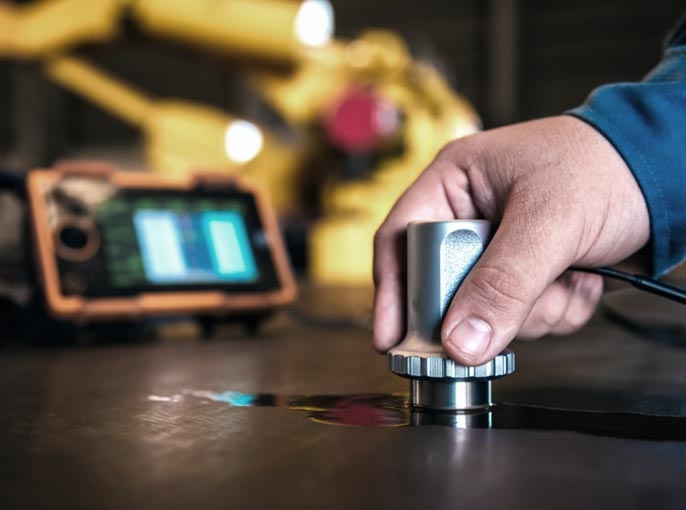Ultrasonic
Testing

Ultrasonic Testing Formula
Commonly used UT Formula are provided for reference
| Featured | Formula | Remarks |
|---|---|---|
| Surface Distance & Depth (1st Leg) |
SD
=
Sound path * Sin θR
Depth (1st leg)
=
Sound Path * Cos θR
|
Image |
| Surface Distance & Depth (2nd Leg) |
SD
=
Sound path * Sin θR
Depth (1st leg)
=
2T - (Sound Path * Cos θR)
|
Image |
| Skip Distance for weld inspection |
Skip Distance
=
2T * tan θR
|
Image |
| Wavelength |
λ
=
V
f
|
Where, λ = Wavelength V = Velocity F = Frequency |
| Near‐field (circular) |
N
=
D2
4λ
N
=
D2F
4V
|
Where, N = Near Field D = Transducer Diameter λ = Wavelength V = Velocity |
| Snell’s law |
Sin θI
Sin θR
=
V1
V2
|
Where, θI = Angle of the Incident Wave θR = Angle of the Reflected Wave V1 = Velocity of Incident Wave V2 = Velocity of Reflected Wave |
| Decibel (dB)Gain or Loss |
dB
=
20 (LogA2A1)
|
Where, dB = Decibel A1 = Amplitude 1 A2 = Amplitude 2 |
| Near‐field (circular) |
Z
=
ρ x V
|
Where, Z = Acoustic Impedance ρ = Density V = Velocity |
| Reflection coefficient |
R
=
( Z2 - Z1 )2
( Z2 + Z1 )2
|
Where, R = Reflection Coefficient Z1 = Acoustic Impedance of Medium 1 Z2 = Acoustic Impedance of Medium 2 |
| Beam divergence- angle (circular) |
Sin θ
=
1.2
λ
D
Sin θ
=
1.2
V
DF
|
Where, λ = Wavelength D = Transducer Diameter V = Velocity F = Frequency |
| Longitudinal (Compression) velocity |
VL
=
√
E(1 - 𝝁)
ρ(1 + 𝝁)(1 - 2𝝁)
|
Where, N = Near Field D = Transducer Diameter λ = Wavelength V = Velocity |
| Transverse (shear) velocity |
Vs
=
√
E
2ρ(1 + 𝝁)
√
G
ρ
|
Where, λ = Wavelength D = Transducer Diameter F = Frequency |
| Angle Beam testing of Pipe |
t
=
d(1 - Sin θ)
2
Sin θ
=
1 - (2td)
|
Where, t = Maximum wall thickness d = O.D. of Pipe θ = Probe angle |
Let’s Connect
NDT. Non-Destructive Testing. That’s our Core Business. That is our Only Business. We live it, We breathe it. We are dedicated to it. Let us use NDT to take your business to new heights.


